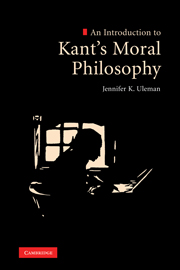Book contents
- Frontmatter
- Contents
- Acknowledgements
- 1 Introduction: the strange thing
- 2 A sketch of Kantian will: desire and the human subject
- 3 A sketch continued: the structure of practical reason
- 4 A sketch completed: freedom
- 5 Against nature: Kant's argumentative strategy
- 6 The categorical imperative: free will willing itself
- 7 What's so good about the good Kantian will? The appeals of the strange thing
- 8 Conclusion: Kant and the goodness of the good will
- Bibliography
- Index
1 - Introduction: the strange thing
Published online by Cambridge University Press: 05 June 2012
- Frontmatter
- Contents
- Acknowledgements
- 1 Introduction: the strange thing
- 2 A sketch of Kantian will: desire and the human subject
- 3 A sketch continued: the structure of practical reason
- 4 A sketch completed: freedom
- 5 Against nature: Kant's argumentative strategy
- 6 The categorical imperative: free will willing itself
- 7 What's so good about the good Kantian will? The appeals of the strange thing
- 8 Conclusion: Kant and the goodness of the good will
- Bibliography
- Index
Summary
THE STRANGE THING
“The thing is strange enough and has no parallel in the remainder of practical knowledge” (KpV 5:31). So writes Kant about the activity of human will. According to Kant, human will authors an ultimate action-guiding principle – a moral law – that tells what matters most and how to act accordingly. It binds itself to this law, experiencing the law's commands as absolute and expecting as reward neither happiness nor heaven, eschewing both sensuous and divine incentives. According to Kant, human will understands the moral law it has authored as holding not only for itself but universally. The strange activity of this strange thing is strange for many reasons. It is free in a determined world; it subjects itself to itself, despite the seeming paradox of this; in the end, and strangest of all, the will that authors and can bind itself to moral law is itself what matters most, is itself the aim of morality. The strange will is thus its own object: at the heart of Kant's moral theory is, to use Hegel's words, “the free will which wills the free will.” The moral law that Kantian free will authors is, to put it another way, strangely and ingeniously self-serving. This book is about all these strange things, and especially about why, for Kant, the strange, free, law-giving will is its own ultimate aim.
- Type
- Chapter
- Information
- An Introduction to Kant's Moral Philosophy , pp. 1 - 22Publisher: Cambridge University PressPrint publication year: 2010



